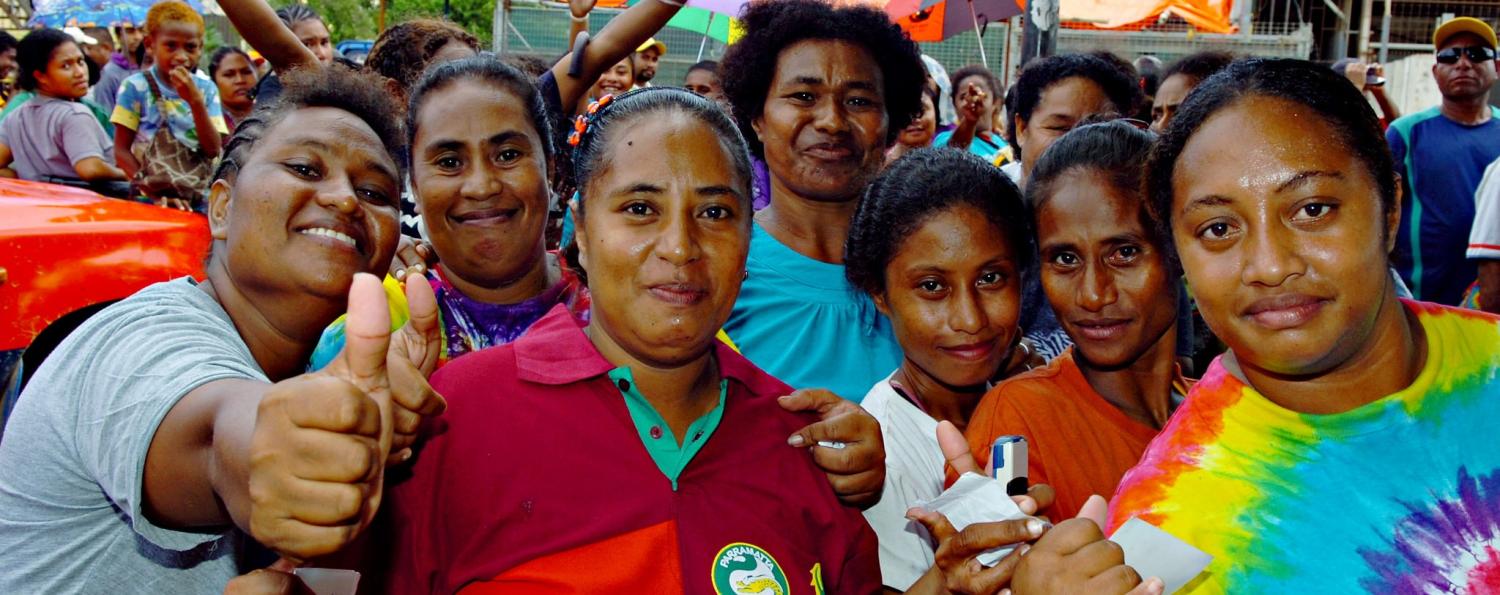Security concerns about external subversion of national elections show no sign of abating. On 3 May, James Comey, then still Director of the FBI, testified to the US Senate Judiciary Committee that the Russian government was attempting to influence American politics, going so far as to say that Russia is 'the greatest threat of any nation on earth' to the US democratic process. On the other side of the Atlantic, hackers released nine gigabytes of emails from Emmanuel Macron’s campaign two days before the French presidential election and in the UK, officials have accused Germany of trying to influence the upcoming general election by undermining Theresa May during Brexit negotiations.
External attempts to manipulate electoral outcomes in politically stable countries that are members of the G7 is certainly troubling. However, electoral manipulation within fragile states in the South Pacific, which do not share the same levels of political or social resilience, could cause catastrophic cascading effects. Destabilising actions that heighten tensions during elections risk triggering political violence with which local law enforcement agencies would struggle to cope. As such, electoral manipulation is not just a threat to political processes in the South Pacific, but also a very real risk to stability across the region. But what could be gained from manipulating elections in the South Pacific?
The aim of electoral manipulation does not need to be a change to the global order. The election of a friendly government or leader may give an external actor more favourable access to emerging markets or natural resources, assured votes in the UN, or simply undermine existing alliances. The reasons may be varied and, in many cases, not immediately apparent. US indignation that Russia attempted to influence the outcome of the US presidential election should be served with a healthy side order of hypocrisy. Research by political scientist Dov Levin has found that the US may have attempted to influence foreign elections as many as 81 times between 1946 and 2000. Most of these were small countries that, for a variety of reasons, the US wanted to see run by a sympathetic government.
So, electoral manipulation is not new, but it does appear that it is now being conducted more brazenly and Australia needs to pay attention. In next three years, four significant elections are expected in our region. Two of these are national (PNG in 2017 and Fiji in 2018) and two are independence referendums (New Caledonia in 2018 and Bougainville, currently forecast for 2019). Of the four, the latter two are most susceptible to interference from external forces. New nations make for new markets, new security partners and new opportunities to increase influence within a region. Independence referendums are also fertile ground for disinformation campaigns. Rumours and passion make for a heady, and often combustible, mix.
The counter to disruptive disinformation aimed at manipulating elections is an accountable news media that populations trust. Australia has traditionally been a major provider of trusted news to the South Pacific through the Australian Broadcasting Corporation (ABC). For geographic reasons, short wave radio was the most effective way of reaching communities in the South Pacific throughout the 20th century. Some have therefore lamented that, just at a time when Australia needs to be a trusted voice across the region, the ABC has ceased its shortwave radio service. An Australian Senator has even raised a bill in parliament which, if passed, would force the ABC to reintroduce the shortwave service. It is true that shortwave radio provided the ABC with a proven platform that could counter misinformation and that is hard to manipulate. However, as the ABC argues, the shortwave radio service is also an outdated media platform that costs a significant amount to maintain. The reality of tight budgets means limited resources need to be prioritised to provide the best content possible over a platform that is accessible to the widest audience.
We live in an increasingly digitally connected world that now largely relies on non-traditional media outlets for its news. A 2016 study from the Pew Research Center estimated 62% of US adults got their news from social media sites. Another study in 2016, by the Reuters Institute, found that 61% of Australians use a smartphone or tablet to access news online, with 52% reporting that they use online sources and social media to get their news.
These trends are visible in developing nations too. Mobile broadband has had a significant impact in the South Pacific. A report published in June 2015 noted that 90% of households across Fiji, Samoa, Solomon Islands, Tonga and Vanuatu had a mobile phone. In Papua New Guinea, the most challenging of nations for market penetration, 44% of the population have mobile phone subscriptions and, as a result, only 10% of national web traffic is accessed by computers while 89% goes to mobile phones. In effect, a large proportion of the South Pacific’s population, regardless of their remote location, have access to a digital world of information through their mobile phone. And the world has access directly to them.
It makes sense therefore for the ABC to concentrate on developing products accessible through the mobile broadband network. According to David Hua, ABC's head of international audiences, there are plans to 'internationalise' the ABC mobile phone app to make it available outside Australia. This would be a good start but more needs to be done. The development of mobile broadband-based platforms needs to be a priority for government as part of a broad security strategy to provide stability in the region. A trusted Australian voice, delivered directly to the people of the South Pacific through their phones, could provide a stabilising influence in an era increasingly characterised by destabilising external forces.


